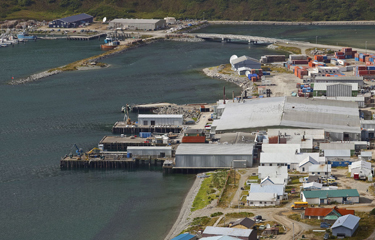Alaska's Peter Pan doubles down on value addition with Northwest Fish merger

Seattle, Washington, U.S.A.-based Northwest Fish and Anchorage, Alaska, U.S.A.-based McKinley Capital Management have beat out Trident Seafoods, Canfisco, and Silver Bay Seafoods to scoop up the assets of Peter Pan Seafood Co. from Japanese conglomerate Maruha Nichiro.
The sale, which was announced by Maruha Nichiro in November 2020, was finalized on 31 December, 2020. Northwest Fish and McKinley collaborated with London, United Kingdom-based RRG Investments on the transaction. Peter Pan Seafood Co. now comprises Peter Pan Seafood’s assets and the value-added sales channels of Northwest Fish Co. The new ownership group is Rodger May of Northwest Fish, the Na’-Nuk Investment Fund (managed by McKinley Capital Management), and the RRG Global Partners Fund (managed by RRG Capital Management).
Northwest Fish Chairman and CEO Rodger May and McKinley CEO and Chief Investment Officer Rob Gillam said they have a collective commitment to operating and expanding the company's assets, which include Alaska processing facilities in King Cove, Dillingham, Port Moller, and Valdez, along with support facilities in Naknek and Sand Point, and headquarters in Bellevue, Washington.
May, who is also president of Northwest Fish, will take on the title of president and chief growth officer for the new entity.
"We are very, very vertical and very much value-added, thus bringing many more jobs per pound of fish than it was," May told National Fisherman in a recorded interview.
On Wednesday, 6 January, the company announced its hiring of Silver Bay Seafoods COO Jon Hickman, who will serve as executive vice president of operations for Peter Pan.
"We will always hire and retain the best. You're going to see a lot of announcements from us in the coming couple of months as we execute on what we think is really a fantastic platform for growth," Gillam said. "But you'll see some opportunities for enhancement coming down the pipeline."
The acquisition merges Peter Pan with Northwest Fish to streamline the flow of up to 50 million pounds of Alaska seafood to value-added products in a proven domestic market.
"One of the big changes," Gillam told National Fisherman in a separate interview, "is putting together this selling organization on top of a processing organization. It created a fully vertically integrated global seafood powerhouse."
The merger, May noted, is set to transform and strengthen both businesses.
"We are a match made in heaven," May said. "They were on one side a wonderful resource. They have the million square feet of production. They have the facilities in perfect locations for what we needed. They were more of a commodity company, and Japanese-owned with a mindset to supply themselves in Japan. And we're on the opposite end of the spectrum. We had no direct access, no million square feet of production in Alaska, and we were deep into value-added, adding to the domestic market. And both of our models were broken. [We] needed resource and the production in Alaska to make our model complete, and they needed the value-added domestic customers versus a commodity company to make their model complete. So both of our broken models now kind of leave us as the favorites going forward."
May invested in Copper River Seafoods three decades ago, helping to grow the company as a premier Alaska salmon brand and a pioneer in selling salmon as a premium seafood based on its origin. He has since divested in Copper River, which is coping with two consecutive low-return seasons for sockeye.
"Nobody knows what the future brings, whether it's with COVID or the fish runs," May said. "But I can say that we are very nimble, very much aware of our need and ability to adapt to what the customer wants. I guess my one wish is that the pandemic does go away. And if I had a wish number two, that lots of fish is going to show up. But we're prepared for everything in between."
McKinley Capital began its seafood portfolio expansion last year with its acquisition of McDowell Group, now called McKinley Research Group. The Peter Pan investment expands that portfolio, bringing together a wealth of information and access to the product as well as the market.
"What's most unusual about our transaction and what's most different relative to the legacy Peter Pan business is that we merged it with Northwest Fish, which is the company's largest fish seller – fish broker, if you want to call it [that]. Rodger May and his team merging into the New Peter Pan Seafood Company. So you'll see us direct traffic to higher value-added and to newer channels that are direct retail, direct consumer that really hasn't been hampered by some of the negative effects of COVID."
Market conditions aside, the investors are finding inspiration in bringing a legacy Alaska brand back under U.S. leadership.
"I think the thing that people are most interested in," Gillam said, "is we're bringing it home to Alaska and America, and I think that is resonating with people in this environment."
Both said they're in it for the long haul.
"The biggest goal is to have something that's going to be around for another hundred years," May said. "Peter Pan has got an amazing story. It's been around for over 100 years already and has the longest operating cannery in Alaska. And our goal is just to continue that tradition, making sure that it's secured its place in history for the next hundred years and making it a bigger, better company."
That history and the future of the company, Gillam notes, depends on the people, including the company's fleet of fishermen.
"Give us a chance," Gillam said. "Bring your critique. We're listening."
Reporting by Jessica Hathaway
Photo courtesy of Peter Pan Foods






Share